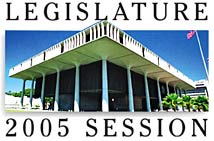Stem cell research
policy delayed
States need to decide whether they are going to pursue expanded research on embryonic stem cells because of a ban on federal funding for most projects, said state Rep. Josh Green, vice chairman of the House Health Committee.
|
|
But the answers require looking at complex moral, health, funding and legal issues that cannot be quickly unraveled during the course of a daily legislative hearing, said Green (D, Keauhou-Honokohau), also a medical doctor.
The committee deferred a bill yesterday that would have broadly defined the state's policy in favor of a resolution to form a task force led by the medical school.
Rep. Dennis Arakaki, committee chairman, said the bill was meant to spark discussion on the subject of stem cell research.
"We don't want to make the decision in a vacuum. We want to involve the community," Arakaki (D, Alewa Heights-Kalihi) said.
Embryonic stem cells form early in an embryo's development and can develop into numerous types of cells to form organs and other parts of the body. Researchers hope to use these cells to repair damaged organs and cure diseases.
The work is controversial because the cells are taken from days-old embryos, which then die. Opponents say this is unethical.
In California, voters approved a measure in November authorizing the state to use $3 billion in bonds for stem cell research.
"It's the statewide policy, the finances and the intellectual commitment all have to be there in order to make this worthwhile so that we can have scientific gains. ... I personally hope we explore it, but that's for the community to decide," Green said.
[News] [Business] [Features] [Sports] [Editorial] [Do It Electric!]
[Classified Ads] [Search] [Subscribe] [Info] [Letter to Editor]
[Feedback]

